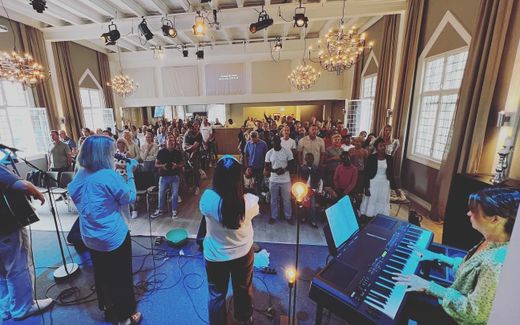What the Bible's youth can bring to Gen Alpha

The Bible has much to say about young people. Photo Unsplash, Ben White
Christian Life
Today, teens may rebel against their parents and scroll endlessly on TikTok. But in Biblical times, they ruled entire nations.
Stay up to date with Christian news in Europe? Sign up for CNE's newsletter.
The Bible paints a different picture as cultural expectations and youth responsibilities plummet to an all-time low. What would happen if modern society held young people to their highest potential?
Jesus's disciples might have been teenagers. And how old was David, when he conquered Goliath? It is very probable that he was far below 20—and he rescued the whole nation. Further, there is this king Josiah in his childhood, and perhaps some of the main characters from the book of Judges.
Ron Becker's research shows that the Bible has dozens of references to youth, which God used to accomplish specific purposes. The pastor and biblical scholar recently earned a PhD and successfully defended his theological dissertation on studying Biblical-era youth at the Vrije Universiteit in Amsterdam.
Throughout his research, he is clear on the Bible's view of young people. They may have been young, and others may have looked down upon them, but God gave them the most important jobs in history.
"God values young people for who they are. They are chosen with a purpose because of their youthfulness, and their youthfulness was vital to the Kingdom of God," Dr Becker says to CNE.
Little na'arah
One of his favourite passages is about the Israelite slave girl in 2 Kings 5, who is described as a little "na'arah," the servant of Namaan's wife. Her actual name is unknown, but her presence remains significant. The girl hears a word from God and tells Naaman that he will be cured of his leprosy if he visits the prophet in Samaria.
Jesus later references Naaman in one of His teachings. "What if she kept her mouth shut?" he says as he thinks aloud. "She had a choice. She didn't have to say something, but she did."
While youthfulness remains important to God's kingdom, how do we know those Biblical figures were young in the first place? Becker says several Hebrew words describe the Bible's youth, often about the transition from youth to adulthood.
For example, na'ar is a general term for youth. This refers, mostly, to a boy in the stage between childhood and adulthood, what we would call adolescence today. Then, there is yeled which refers to a child in general. These references are used throughout the Bible, he says.

In addition to the general terms used to describe youth, it is also important to pay attention to the words that describe their roles. For example, the story of Hagar's son (which is likely Ishmael) in Genesis 21 has no less than four different names to describe him. First, the word ben (son) is used by Sarah to create distance against him, then zera' is used by Abraham and refers to him being the offspring or seed that will give Abraham descendants. Hagar uses yeled, which is derived from yalad, a verb that can refer to several stages of coming to life -- conception, giving birth and even breastfeeding, and this describes the child in relation to both parents. Lastly, the word na'ar is used by (the Angel of) the Lord), and it refers to the boy becoming a great nation.
In addition to the names given in Genesis 21, Genesis also wins when it comes to the number of young people mentioned in the Bible. Another book, 2 Kings, also references more children than others. The count also includes youth mentioned within descriptions of family lines or genealogy.
There are dozens more in the New Testament. Some examples include Jairus's daughter being raised from the dead, the boy feeding the five thousand, and Mark 14 briefly describing a young person running away without clothes.
More to be done
While na'ar can be a general term for youth, Becker cautions that we must be careful about their exact age. For example, many Christians think that the age of 12 bears some significance in Jewish culture, like a transition into adulthood. Several commentators refer to Jesus being 12 years old when he started preaching in the temple.
However, Becker says this is a common misconception as only a few Biblical references exist to that specific age. In ancient Hebrew culture, the age of 20 was considered the point at which a person could be held fully accountable, he notes.
And were the disciples teens when they started their ministries? "Most likely, but the Bible does not give evidence, and it is worth doing more research," he says.
Despite countless hours of research studying the Hebrew contexts for youth, Becker emphasises there is room for more investigation. Yet, one thing is clear: God used young people to accomplish God's dream for humanity. What matters most when studying them is exploring a story verse by verse as it is. It takes time to see it. Once you do, you cannot unsee it, he says.
A narrative lens: The key to searching for young people in the Bible
Information on young people is scarce in Biblical commentaries, Becker says, and misconceptions continue to be circulated. Therefore, he chose to study young people in the Bible with a narrative approach.
The (Hebrew) language used to refer to young people was the entry point to indicate whether young people were in the story; the narrative method served to observe these young people and their agency in the dynamics of the narrative.
This enables us to zoom in on relatively unknown young characters like Jether in Judges 8, whose youthful presence has an enormous impact on his father Gideon's choices and, therefore, the outcome of a course of events, he says.
Related Articles










